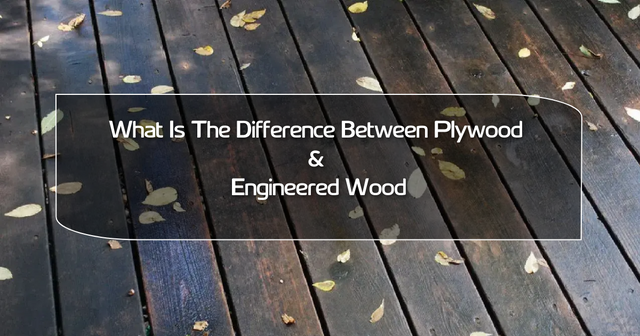What Is The Difference Between Plywood & Engineered Wood

For people buying wood for furniture and other construction purposes, engineered wood seems like the most popular option these days. Engineered wood is the synthetic alternative to natural/solid wood, which is cost-effective but can be equally strong and durable. Plywood is one of the most popular and widely used types of engineered wood.
So, how is plywood different from other engineered woods? Let’s find out.
Engineered Wood
All woods that are man-made and are not naturally procured from trees are called engineered woods. Based on the type, amount of wood and other elements, engineered wood can be of many types, including plywood, particleboard, blockboard, MDF, and others.
Engineered wood is also commonly called composite wood or manufactured wood. Common elements used to make engineered wood are wood strands, particles, veneer, sawdust and adhesives.
Engineered woods have some specific advantages over solid wood. For one, they are cheaper than real wood and are therefore suitable for woodworking projects with a low budget. Engineered wood is very strong, durable and can be made in a variety of shapes and sizes to fit different application requirements. Also, it is easily available and can be imported for a moderate price. Engineered woods come in different grades based on the quality, thickness and wood species used to manufacture them. They are generally easy to work with and cut, glue and finish well.
Some types of engineered woodare less strong and may not be suitable for general applications such as outdoor furniture and others.
Plywood
Plywood is one of the premium types of engineered woods. In fact, it’s the most popular and widely used wood alternative that is both inexpensive and quite strong. Unlike some engineered woods that are made of sawmill scrap and other wood waste, plywood is made from solid wood (hardwoods and softwoods). To be specific, plywood is made by combining solid wood veneers (thin layers of wood) using moisture-resistant adhesives under heat and pressure conditions. Additionally, the layers of wood are arranged such that the grain of adjacent layers is perpendicular to each other to provide the maximum possible strength to it.
Plywood is super strong, durable and incredibly versatile as it can be used across a large variety of applications including interior, exterior and construction. It is perfect for building structural frames for buildings, furniture, etc. as well as for internal panelling. And it is available in different sizes and can also be made in larger sizes than natural wood (which have limited size options available).
Plywoods have their strength spread uniformly across the dimensions, making them suitable for heavy load uses.
Plywoods are less expensive than solid wood but costlier than particleboards, blockboards and other types of manufactured wood boards. They are easily available in all parts of the world.
The only disadvantage of plywood is that it can sometimes bend or sag when used in large sizes. Since they are available in different grades (quality) and thicknesses, plywoods are suitable for a large variety of purposes including furniture, cabinets, construction, doors, roofing, flooring, interior walls, exterior wall sheathing, crates, boxes, and more.
Plywood Vs Engineered Wood
Plywood is also a type of engineered wood, but it is much different from other types of engineered wood that are generally made of low-quality products like wood waste and scrapes. Plywood is made of solid wood (layers) and is stronger than any other type of engineered wood. It is also more expensive. In fact, plywood can be considered as strong as the original wood it is made of. Plywoods can easily last for years, if not decades, depending on the material they are made of. Additional lamination and veneering on plywood can further help increase their life by many years.